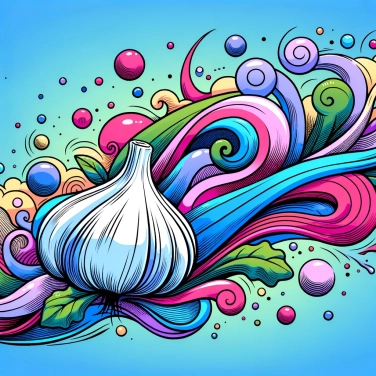Garlic contains sulfur compounds such as allicin, which break down into various volatile molecules responsible for its strong and distinctive odor.

Garlic has a strong smell due to a particular family of molecules, the famous sulfur compounds. When garlic is whole and intact, these molecules are nearly odorless because they are in a stable form called alliin, which remains discreet. The moment you cut or crush your garlic, you break cells, and a special enzyme (alliinase) comes into action to transform alliin into a more fragrant molecule: allicin. This very unstable compound quickly decomposes into other sulfur derivatives, which are more volatile and highly odorous, attacking your nostrils with their powerful, sharp smell that is unmistakable.
The pungent smell of garlic comes from a chemical reaction that starts when it is cut or crushed. Initially, it mainly contains a molecule called alliin, which is completely odorless. But as soon as the garlic cells are broken, an enzyme called alliinase, which had been quietly sitting in its own area until then, suddenly comes into contact with alliin. At that moment, alliinase activates and quickly transforms alliin into a very fragrant and pungent molecule, allicin. And it is precisely this allicin that gives garlic most of its intense aroma. This process takes only a few seconds at room temperature once the bulb is damaged, which explains why you immediately smell the odor.
The sulfur compounds in garlic are particularly volatile, meaning they easily transition from a liquid state to a gaseous state. This volatility primarily stems from their small molecular size and the low molecular weight of molecules like allicin and diallyl sulfides. Low molecular weight is a bit like the molecules being ultra-light and hyperactive: at room temperature, they easily detach and fly directly into your nose. These sulfur compounds also have very low polarity, allowing them to evaporate quickly and float easily in the air. The result: the strong, pungent odor of volatile molecules spreads quickly and far—around, everywhere, sometimes even to the neighbor's house.
When you crush or chop a clove of garlic, you release allicin, a highly volatile sulfur compound. These volatile molecules float in the air and quietly settle on your nasal mucosa. There, they activate specific olfactory receptors located on sensory neurons in your nose. These small receptors work a bit like a key in a lock: the sulfur molecule fits perfectly and immediately triggers a nerve impulse to your brain. The brain analyzes the signal as a strong, sharp, and typical smell of garlic. In small doses, it is appetizing, but in larger quantities, it can become downright aggressive, strongly stimulating your olfactory system and even causing you to react by wrinkling your nose or pulling back a bit.
When you cut or crush a clove of garlic, allicin forms very quickly, triggering a powerful and pungent smell. Over time, this odor evolves as allicin gradually transforms into less aggressive compounds like diallyl disulfide, which remains intense but milder. Cooking garlic further alters its aromatic profile: gentle cooking brings a sweet and almost caramelized scent, while cooking it too vigorously results in a more bitter taste with less pleasant burnt notes. Conversely, leaving chopped garlic exposed to air for a long time dulls its abrasive smell in favor of more subtle and slightly nutty aromas. Whole roasted garlic becomes sweet, creamy, and develops delicate, almost candied fragrances, far removed from the initial intensity.
In ancient Egypt, garlic was given to the workers building the pyramids to enhance their endurance and prevent illnesses due to its antibacterial and fortifying properties!
Rubbing your hands on a stainless steel surface under cold water can effectively help reduce the persistent smell of garlic on your skin, thanks to a chemical reaction between the metal and the sulfur compounds.
Eating parsley, mint, or drinking whole milk can greatly reduce garlic breath, as these foods neutralize or capture the volatile sulfur compounds responsible for bad breath.
Allicin, the main compound responsible for the strong smell and medicinal properties of garlic, does not exist in an intact garlic clove: it only forms after crushing or cutting, due to enzymatic action.
The odor occurs when the compounds in garlic react chemically with the skin. To get rid of it, rubbing your hands with lemon juice, baking soda, or even washing them under cold water while touching a stainless steel object can effectively neutralize these odor-causing compounds.
Yes, cooking reduces the intensity of garlic's smell because it decreases the presence of allicin and other volatile sulfur compounds by chemically transforming them into less odorous compounds.
Yes, the sulfur compounds present in garlic, such as allicin, have several potential benefits, including antimicrobial, antioxidant properties, and benefits for the cardiovascular system.
The sensitivity to the smell of garlic depends on several factors such as genetics, individual differences in olfactory capacity, and even cultural variations related to the habit of consuming strong spices and herbs.
After consuming garlic, certain sulfur compounds, particularly allicin and its derivatives, enter the bloodstream and the lungs. Therefore, as long as these compounds are not completely eliminated by the body, they may continue to be expelled through respiration, causing persistent breath odor.

0% of respondents passed this quiz completely!
Question 1/5